人教版新目标九年级英语Unit3单元教案AUqUAM
- 格式:doc
- 大小:457.50 KB
- 文档页数:10
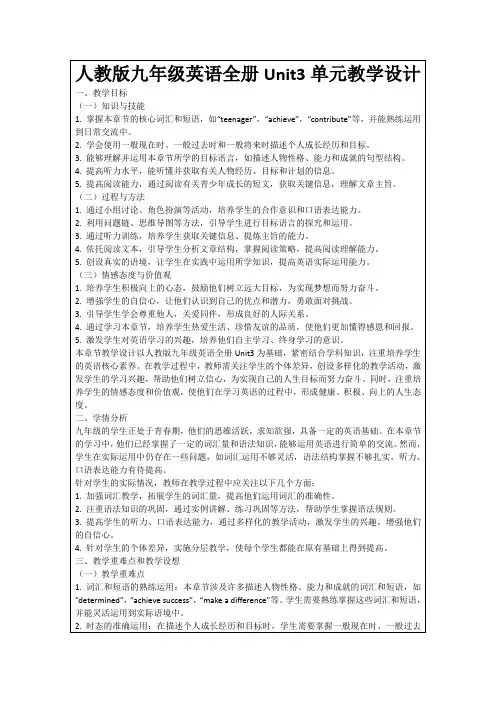
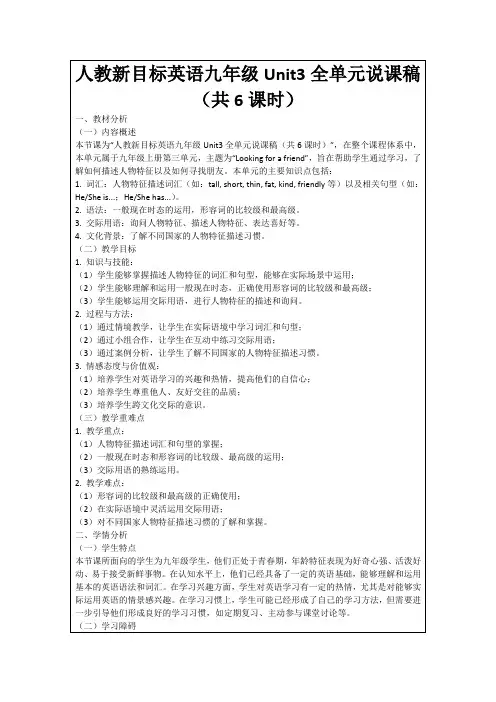
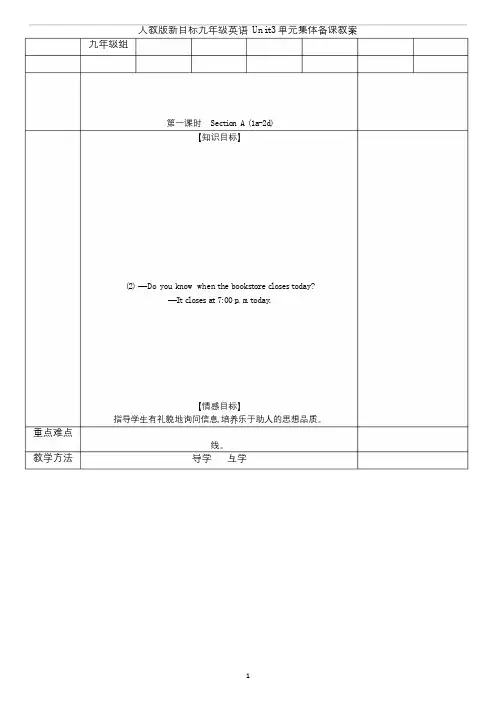
人教版新目标九年级英语Uni t3单元集体备课教案九年级组第一课时Sec t ion A (1a-2d)【知识目标】(2)—Do you know when the books t ore c loses today?—I t c loses a t 7:00p.m.today.【情感目标】指导学生有礼貌地询问信息,培养乐于助人的思想品质。
重点难点教学方法线。
导学互学Step 2完成教材1a-1c的任务【操作案例】A: Excuse me! Could you p lease t e l l me where the re i s a good p laceto ea t?A:I l ike I t a l i an food.B:We have two I ta l i an r e s tauran ts. One i s on the Main S t ree t, named Green Land. 2. F ,called Sally’s.A: 3.C?B:Sally’s is a little nearer but it’s expensive. Green Land i s fa r ther but the food i s bo th del i c ious and cheap.A:Let’s go to Green land! But 4.B?A: 5. E !环节说明:通过学习1a,使学生对宾语从句有所了解;通过1b,锻炼学生的听【操作案例】4.In China,“restroom” is not commonly used as the “toilet” or “washroom”.5.The Fun Times Park c loses a t n ine th i r ty today.九年级组res t rooms are?第二课时Sect i on A(3a~3c)【知识目标】(1)I was sca red a t f i r s t,bu t shou t ing d i d he lp.(2)I s the I t a l i an rest auran t nearby open on Mondays?(3)Pardon me,do you know if there’s a restaurant aro und he re?(4)You go eas t a long th i s s t ree t.【能力目标】展应用。
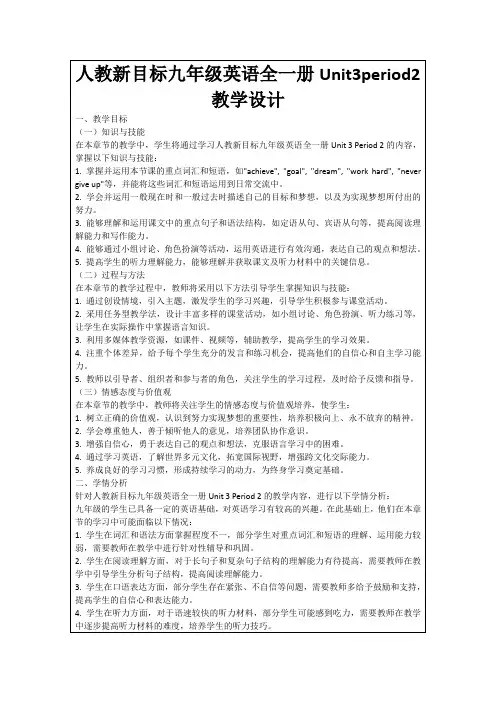
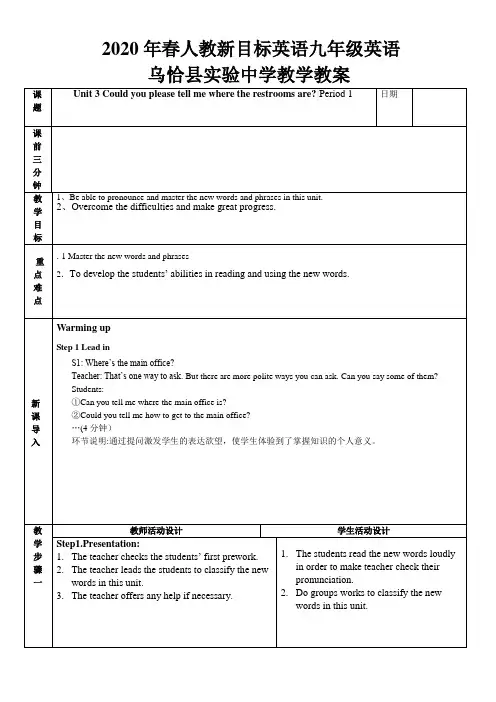
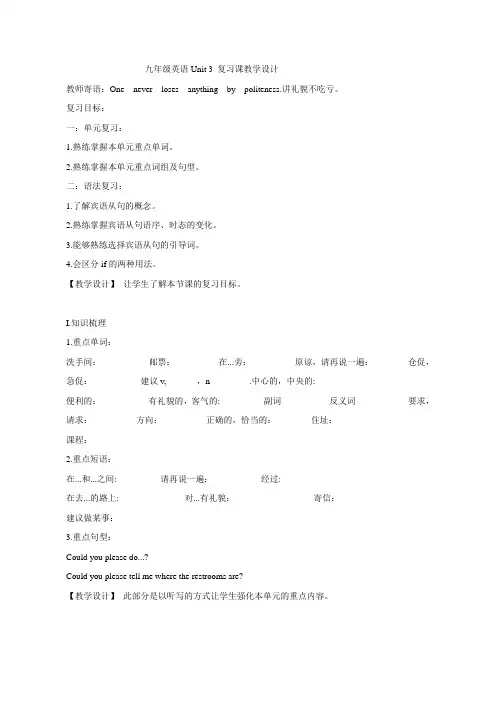
九年级英语Unit 3 复习课教学设计教师寄语:One never loses anything by politeness.讲礼貌不吃亏。
复习目标:一:单元复习:1.熟练掌握本单元重点单词。
2.熟练掌握本单元重点词组及句型。
二:语法复习:1.了解宾语从句的概念。
2.熟练掌握宾语从句语序、时态的变化。
3.能够熟练选择宾语从句的引导词。
4.会区分if的两种用法。
【教学设计】让学生了解本节课的复习目标。
I.知识梳理1.重点单词:洗手间:___________邮票:__________在...旁:__________原谅,请再说一遍:________仓促,急促:___________建议v,_______,n_________.中心的,中央的:____________便利的:___________有礼貌的,客气的:__________副词___________反义词____________要求,请求:__________方向:__________正确的,恰当的:________住址:_________课程:___________2.重点短语:在...和...之间:_________ 请再说一遍:___________经过:______________在去...的路上:______________ 对...有礼貌:__________________寄信:_____________建议做某事:_________________3.重点句型:Could you please do...?Could you please tell me where the restrooms are?【教学设计】此部分是以听写的方式让学生强化本单元的重点内容。
II.语法复习1.概念:①.宾语:指一个动作(动词)的接受者,常置于动词,介词之后,也有双宾语结构。
完成句子:我正在看电视。
I ______ _______ _________.他们对英语感兴趣。
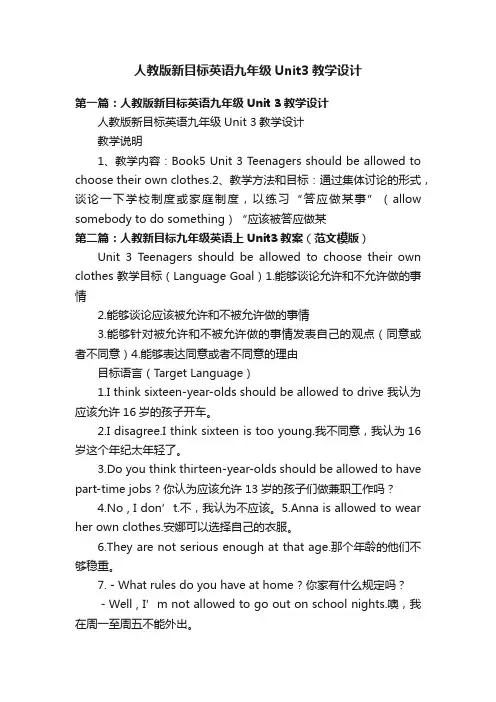
人教版新目标英语九年级Unit3教学设计第一篇:人教版新目标英语九年级Unit 3教学设计人教版新目标英语九年级Unit 3教学设计教学说明1、教学内容:Book5 Unit 3 Teenagers should be allowed to choose their own clothes.2、教学方法和目标:通过集体讨论的形式,谈论一下学校制度或家庭制度,以练习“答应做某事”(allow somebody to do something)“应该被答应做某第二篇:人教新目标九年级英语上Unit3教案(范文模版)Unit 3 Teenagers should be allowed to choose their own clothes 教学目标(Language Goal)1.能够谈论允许和不允许做的事情2.能够谈论应该被允许和不被允许做的事情3.能够针对被允许和不被允许做的事情发表自己的观点(同意或者不同意)4.能够表达同意或者不同意的理由目标语言(Target Language)1.I think sixteen-year-olds should be allowed to drive 我认为应该允许16岁的孩子开车。
2.I disagree.I think sixteen is too young.我不同意,我认为16岁这个年纪太年轻了。
3.Do you think thirteen-year-olds should be allowed to have part-time jobs ? 你认为应该允许13岁的孩子们做兼职工作吗?4.No , I don’t.不,我认为不应该。
5.Anna is allowed to wear her own clothes.安娜可以选择自己的衣服。
6.They are not serious enough at that age.那个年龄的他们不够稳重。
7.-What rules do you have at home ? 你家有什么规定吗?-Well , I’m not allowed to go out on school nights.噢,我在周一至周五不能外出。
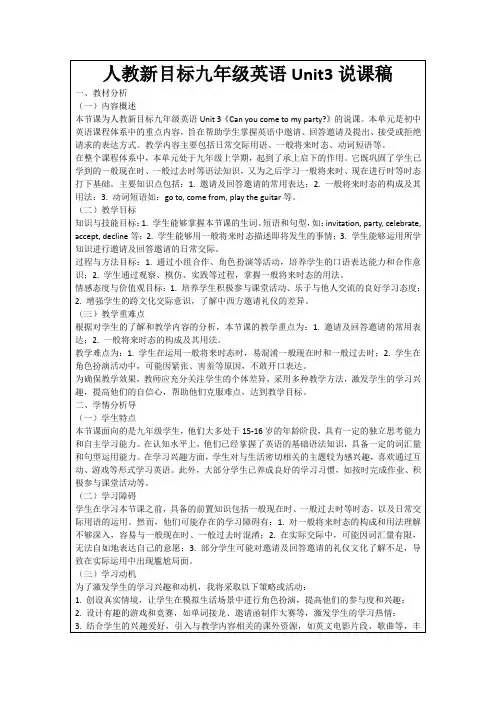
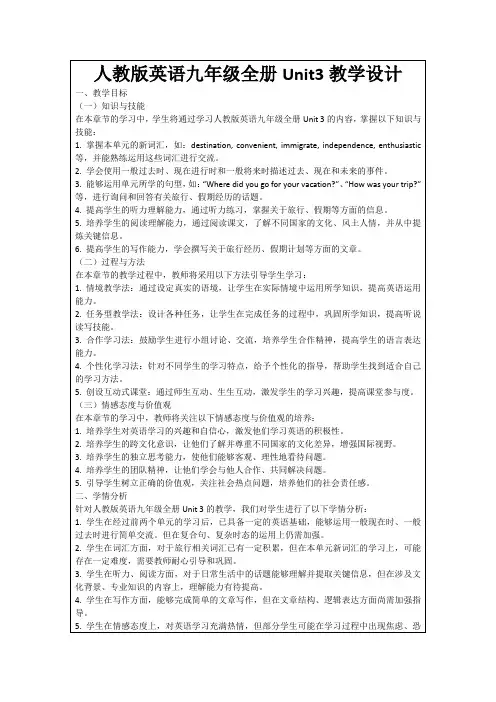
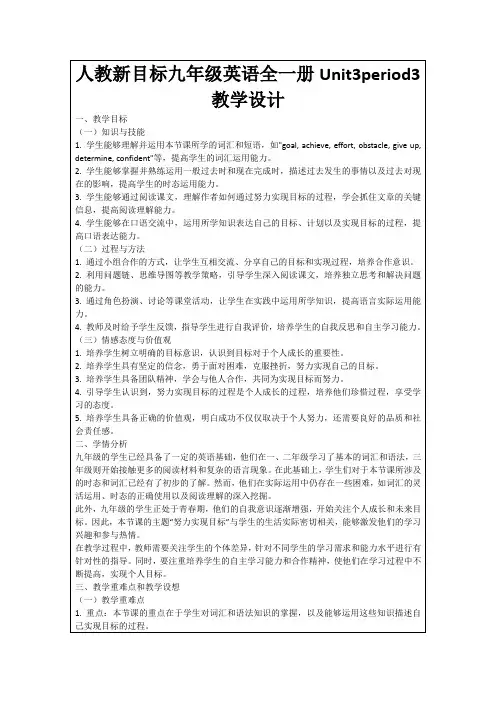
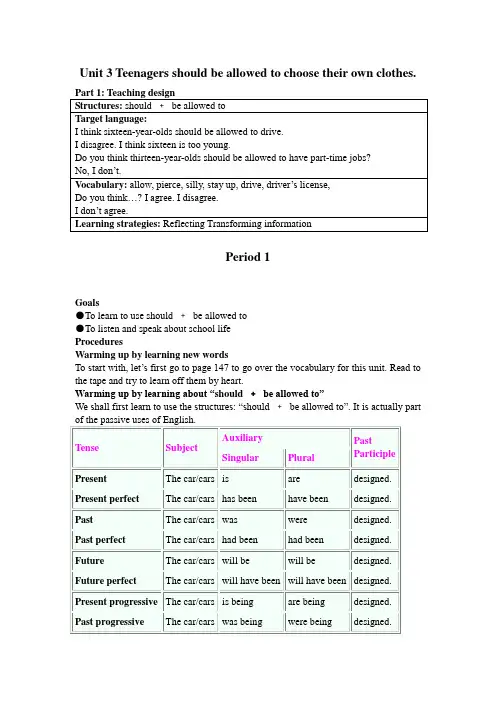
Unit 3 Teenagers should be allowed to choose their own clothes.Period 1Goals●To learn to use should ﹢be allowed to●To listen and speak about school lifeProceduresWarming up by learning new wordsTo start with, let’s first go to page 147 to go over the vocabulary for this unit. Read to the tape and try to learn off them by heart.Warming up by learning about “should ﹢be allowed to”We shall first learn to use the structures: “should ﹢be allowed to”. It is actually part“should ﹢be allowed to” can be used like this: He should be allowed to come. Animals should be allowed to live in the forest. Children should be allowed to watch TV at weekends.1a Reading and circlingFor practice of the “should ﹢be allowed to” r ead the statements in the box on page 18 and circle A for agree or D disagree.1b Listening and circlingListen and circle “T” for true or “F” for false beside the statements in the box on page 18.Now try to copy the expressions from the listening tapescript on the blackboardIn pairs look at the statements in activity 1a and makeconversation. You may use the phrases in the box on page 18A: I think teenagers should be allowed to go out with their friends.B: I agree. They are old enough.A: I think teenagers should be allowed to go to the mall with their classmates.A: I think teenagers should be allowed to get their driver’s license.A: I think teenagers should be allowed to drive.A: I think teenagers should be allowed to get their ears pierced.A:I think teenagers should be allowed to watch TV at weekends.A: I think teenagers should be allowed to take the school bus.A: I think teenagers should be allowed to buy a new blouse at the mallA: I think teenagers should be allowed to choose their own clothes.B: I agree. They are old/ clever/ strong/ bright/ serious/ kind/ careful/ lucky/ enough.Goals●To learn to use should ﹢be allowed to●To listen and speak about school life2a Listening and checkingNext we are going to listen and check on page 19 what Kathy thinks. You may circle “Agree”, “Disagree”, or “Doesn’t know” to show what Molly thinks.2b Listening and numberingYou are going to listen again to the recording just now tonumber Kathy’s and Molly’s reasons in the correct order onpage 19.Next you are going to make in pairs a list of things teenagersshould and should not be allowed to do. Discuss your listwith your partner.A: Do you think teenagers should be allowed to drive?B: Yes, I think so.A: Do you think teenagers should be allowed to work late at night?B:No, I don’t think so. I don’t think they should be allow ed to work late at night. They need to get enough sleep.A: Do you think teenagers should be allowed to disagree with their teachers?B: Yes, I think so.A: Do you think teenagers should be allowed to get tired doing their homework?B:No, I don’t think so.A: Do you think teenagers should be allowed to work every night?B: Yes, I think so.A: Do you think teenagers should be allowed to cut one’s hair?B: Yes, I think so. I kind of like my own style. It looks cool.A: Do you think teenagers should be allowed to have many friends?B:No, I don’t think so. They may meet bad people if they have too many friends.A: Do you think teenagers should be allowed to work on weekends?B: It depends on what they do. They may spend time with parents on weekends.Goals●To read about rules of school●To write about rules of school3a Reading and writingYou are to read a dialogue between Sun Fei and Wu Yu on page 20. After reading you shall write in the chart Sun Fei’s and WuYu’s rules. Use “Don’t…” and “You can” to express your ideas.In pairs role play the conversation in 3a using the information in the chart on page 20. A: What rules do you have at home?B:Well, I’m not allowed to go o ut on school nights. How about you?A:I’m not allowed to go out on school nights either. But I can watch TV with my sister.A: What rules do you have at school?B:Well, We’re not allowed to go out to movies on school nights. How about you?A:We’re not a llowed to go out to movies on school nights either. But We can watch VCD with our teachers on the school playground.4 Doing groupworkTurn to page 20 and find someone in your group who has to g o home after school, who is allowed to stay up until 11:00 pm, who has to stay at home on school nights, who is allowed to watch TV every night, who had to clean up his room every morning.Write their names in the chart on page 20Goals●To read about rules of school●To talk about rules of schoolProceduresWarming up by talking about rulesHello, class. Are there any rules for us in this class? What are they? How were they made?Now list some of them and talk about them in pairs.1a Reading and checkingRead the questions on page 21 and writ e either “A” for always, “U” for usually, “S”I am going to play a dialogue to you. It is between a man and a boy called Peter. They are talking about a math test. You are to listen and circle the things in activity 1a you hear. While listening try to note the expressions used.2b Listening and matchingListen again to the dialogue and match the sentence parts in the box on page 21.Now copy down the expressions from the dialogue into your notebook. They are shown on the blackboard.2c Doing group workPeriod 5Goals●To read about rules of school●To write about rules of school3a Reading and answeringNext it’s reading time. Let’s read the article on page 22 and answer the questions following it. Try to put the sentences into parts and underline the expressions.3b Doing pairworkRole play a conversation using information from 3a.A:I think our school rules of always wearing school uniforms at school should be changed.B: Well, Mary and I talked about the rules the other day.A: At our school, we have to wear uniforms every day. That is bad for us.B: Yes, I agree. The problem is that all of us think the uniforms are ugly.A: I think young people should look smart and so we should be allowed to wear our own clothes.B: But our teachers believe that if we did that, we would concentrate more on our clothes than our studies.A: I disagree with them. We would feel more comfortable and that is good for studying. If we can't do that, we should be allowed to design our own uniforms. That would be a good way to keep both teachers and us happy.B:It’s also probably a good idea for parents to allow us to study in groups during evening.A: I think so. I know we get noisy sometimes, but we learn a lot from each other.B: I also think that vacations should be longer.A: I agree with you on that. At present they're too short. Longer vacations would give us time to do things like volunteering.B: Last summer I had an opportunity to volunteer at the local hospital, but I couldn’t because I had to go back to schools. It would be a good experience for me because I want to be a doctor when I'm older.A:Let’s go to talk to our teachers about the school rules after school.B: OK! I agree with you!4 Making a list of rulesSuppose you and your friend are starting an English club. Make a list of rules aboutPeriod 6SELF CHECK1 Filling in blanksTo test your study this week you are to fill in each blank on page 23 with a correct word given. Change the form if it is necessary.2 Reading and writingYou are going to read the article on page 23 first and then write a letter to the editor agreeing or disagreeing. Explain your reasons.While you are reading cut the sentences into thought groups and underline the expressions.3. Helping and learningAt our school, we sometimes have a special day/ to help others. Last year/ we went to an old people’s home/ and sang songs/ and performed a play /for them. The old people were very happy. We should be allowed/ to take time/ to do things/ like that/ more often. For example, we should visit primary schools/ and help teach young students. I want to be a teacher/ when I'm older/ so it would be a great experience/ for me. Other students would like to do other jobs. For example, my friend Tian Ge wants/ to write for a newspaper. She should be allowed/ to volunteer/ at the newspaper office/ once a week. On Friday afternoons, many students are sleepy/ after a long week of classes. Some students should be allowed/ to have Friday afternoonsTo end this busy period we shall take time to learn and read aloud an English poem for kids.Reading: Should I be allowed to make my own decisions?Before you read, go over the new words for this part on 148.While you read, listen to the recording and underline all the expressions.Many teenagers have hobbies. But sometimes these hobbies can get in the way of schoolwork, and parents might worry about their child's success at school. Teenagers often think they should be allowed to practice their hobbies as much as they want. Do you agree?Liu Yu, a fifteen-year-old from Shandong, is a running star. He is in his school running team, and has always wanted to be a professional athlete. However, his parents won't allow him to train as much as he would like to. "Of course we want to see Liu Yu achieve his dreams,”says Mr Liu, “and we know how much he loves running. That's great, and my wife and I watched him in every one of his races. We have nothing against running! But we do think that our son needs to be realistic. Now he is getting older, he needs to think about what will happen if he doesn't become a professional runner in the end.”Liu Yu doesn't really agree. “Well, I think I should be allowed to make decisions for myself,”he s ays. “ My parents have always taught me the importance of working hard and not just to do what I enjoy. I understand this. But I'm serious about running. Being a professional runner is the only thing I have ever wanted to do.”Mr and Mrs Liu believe that Liu Yu should study hard in the evenings, and so they don't allow him to practice running on school nights. “I know this might seem strict,”says Mrs Liu, “but we think we're doing the right thing. He has to understand that very few people can become professional athletes. It's a very difficult dream to achieve. We don't allow him to practice every day because we think he needs to spend time on his homework.”But Liu Yu still doesn't agree. “I know my parents care about me,” he says. “But they are always talking about what will happen if I don't succeed. But I will succeed! I think I should be allowed to make this decision myself. Only then will I have a chance of achieving my dream.”After you read, read aloud the text again, to yourself, or to the tape and copy down all the expressions, too.。
人教版新目标九年级英语《Unit3 Could you please tell me where the restrooms are》教案Section A (1a-2d)1.重点单词:restroom,stamp,bookstore,beside,postcard,pardon,washroom,bathroom,normally,rush2.重点短语:take out the rubbish,fold your clothes,sweep the floor,make your bed,go out for dinner,get a ride3.重点句式:—Could you please tell me how to get to the bookstore?—Just go along Main Street until you pass Center Street.—Do you know when the bookstore closes today?—It closes at 7:00 p.m. today.Do you know where I can get some postcards?I don't mean a room for resting.1.重点短语和句型2.疑问代词、疑问副词引导的宾语从句疑问代词、疑问副词引导的宾语从句一、预习课本P17-18新单词并背诵,完成下面的汉译英。
1.洗手间________ 2.邮票________3.书店________ 4.在旁边________5.明信片________ 6.抱歉________7.洗手间________ 8.浴室________9.通常________ 10.仓促________二、认真预习1a-2d找出下列短语和句型。
1.取一些钱________________________________________________________________________ 2.买一双鞋________________________________________________________________________ 3.—你能告诉我怎么到达商店吗?—沿着Main大街走,直到你经过Center Street。
Unit 3Could you please tell me where the restrooms are?Section A (1a-2d)1.重点单词:restroom,stamp,bookstore,beside,postcard,pardon,washroom,bathroom,normally,rush2.重点短语:take out the rubbish,fold your clothes,sweep the floor,make your bed,go out for dinner,get a ride3.重点句式:—Could you please tell me how to get to the bookstore?—Just go along Main Street until you pass Center Street.—Do you know when the bookstore closes today?—It closes at 7:00 p.m. today.Do you know where I can get some postcards?I don't mean a room for resting.1.重点短语和句型2.疑问代词、疑问副词引导的宾语从句疑问代词、疑问副词引导的宾语从句一、预习课本P17-18新单词并背诵,完成下面的汉译英。
1.洗手间________ 2.邮票________3.书店________ 4.在旁边________5.明信片________ 6.抱歉________7.洗手间________ 8.浴室________9.通常________ 10.仓促________二、认真预习1a-2d找出下列短语和句型。
1.取一些钱________________________________________________________________________2.买一双鞋________________________________________________________________________3.—你能告诉我怎么到达商店吗?—沿着Main大街走,直到你经过Center Street。
________________________________________________________________________________________________________________________________________________4.—你知道书店今天什么时候关门吗?—它在晚上7:00关门。
________________________________________________________________________________________________________________________________________________5.你知道我能在哪儿买到明信片吗?________________________________________________________________________6.我的意思不是休息的房间。
________________________________________________________________________Step 1情景导入Teacher:Have you ever been to a strange place or a strange city?Students:Yes,I have.Teacher:What would you do if you have any difficulties there?Student1:I'd ask for help...Teacher:This class we'll learn how to ask the way or how to ask for help.环节说明:通过师生互动,引出本节课的语言学习目标——有礼貌地问路和求助。
Step 2完成教材1a-1c的任务1.学生朗读1a中的短语,教师纠正错误读音,然后学生识记单词并且两人一组互相提问。
(3分钟)。
2.我们能在哪些地方做这些事情呢?将地方和事情相匹配,完成后小组内互相核对答案。
(2分钟) 3.阅读1a中的对话,为听力做好准备。
(2分钟)4.听录音,根据听力内容将1a中的对话补充完整,然后集体核对答案。
(3分钟)5.再听一遍录音,并跟读对话。
(2分钟)6.结对练习1c中的对话,并请一些学生表演出他们的对话。
(3分钟)7.模仿1c中的对话,用1a中的信息与同伴编练新对话来讨论你的城市,并邀请几组学生表演对话。
(5分钟)参考案例A:Excuse me,could you please tell me how to get to the bookstore?B:Sure,just go along Main Street until you pass Center Street.The bookstore is on your right,beside the bank.A:Thanks.Do you know when the bookstore closes today?B:It closes at 7:00 p.m. today.8.小结训练。
(3分钟)(A)1.Can you tell me ________?A.where he is B.where is heC.he is where(C)2.I didn't know how ________ to London?A.would they go B.are they goingC.they would go(A)3.Could you tell me ________ we get to the airport?A.how B.whether C.where环节说明:听说结合,第一时间向学生传达语言目标,通过结对对话练习和小结训练,使语言目标得以强化。
Step 3完成教材2a-2c的任务1.大声朗读2a中的短语和句子,然后听录音,将2a中的句子按听到的顺序排序,集体核对答案。
(3分钟)2.再听一遍录音,根据录音内容在2a图片上画出男孩到达超市的路线,完成后小组内核对答案。
(3分钟)3.听第三遍录音,学生跟读。
(3分钟)4.让学生利用2a中的信息仿照2c 的形式练习对话,并要求多组同学表演对话。
(5分钟)参考案例A:Excuse me,do you know where I can get some postcards?B:Sure.Go to the second floor.There is a bookstore between the bank and the supermarket.5.小结训练。
(3分钟)汉译英1.向左转turn_left2.向右转turn_right3.去二楼go_to_the_second_floor4.经过书店go_past_the_bookstore5.你知道我在哪里能买到明信片吗?Do_you_know_where_I_can_get_some_postcards?环节说明:通过听、说、读、写学习训练让学生掌握了问路指路的句型;并且使学生的口语表达能力在这一环节得到提升。
Step 4完成教材2d的任务1.学生自读对话,理解对话内容,并且画出有疑问的句子。
(2分钟)2.小组内互相提问解决遇到的疑难问题,教师点拨重难点。
(3分钟)3.大声朗读2d中的对话,读熟后与同伴结对练习,分角色表演对话。
(3分钟)4.邀请三组学生来表演对话。
(5分钟)5.小结训练。
(3分钟)连词成句1.I,rides,am,the,excited,try,toI_am_excited_to_try_the_rides!2.I,resting,don't for,mean,room,aI_don't_mean_a_room_for_resting.3.I,today,wonder,closes,when,park,theI_wonder_when_the_park_closes_today.环节说明:学生自学和小组合作学习相结合,有利于提高学生的自学能力和团队合作精神;小结训练又对对话中的重要句型进行了巩固加深。
Step 5问题探究宾语从句1.你知道他刚才说什么了吗?Did_you_know_what_he_said_just_now?2.我想知道我们什么时候到达。
I_wonder_when_we_will_arrive.3.我问他我在哪里能挣到如此多的钱。
I_asked_him_where_I_could_earn_so_much_money.4.请告诉我我们必须要见谁。
Please_tell_me_who_we_will_have_to_meet.5.你知道飞机什么时候起飞吗?Do_you_know_when_the_plane_will_take_off?当宾语从句是特殊疑问句时,由连接代词what、who、whom、whose、which或连接副词when、where、how、why引导,因为连接代词或连接副词在从句中担任一定的句子成分,具有一定的意义,所以不可以省略。
请学生们做前面课时训练部分。
Section A (3a-3b)1.重点单词:suggest,staff2.重点短语:come on,pass by,on one's way to...3.重点句式:Let's ask what time the band starts.Alice and He Wei walk up to a staff person at the door.Come a little earlier to get a table.1.重点短语和句型2.学会有礼貌的提出请求1.重点短语和句型2.学会有礼貌的提出请求一、预习课本P19新单词并背诵,完成下面的汉译英。
1.建议________ 2.职工________二、认真预习3a-3b找出下列短语和句型。
1.加油________________________________________________________________________2.经过________________________________________________________________________3.在某人去……的路上________________________________________________________________________4.让我们去问一下乐队什么开始(表演)。